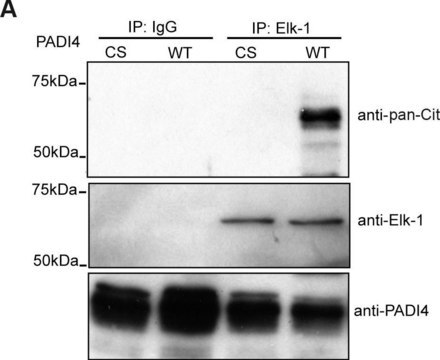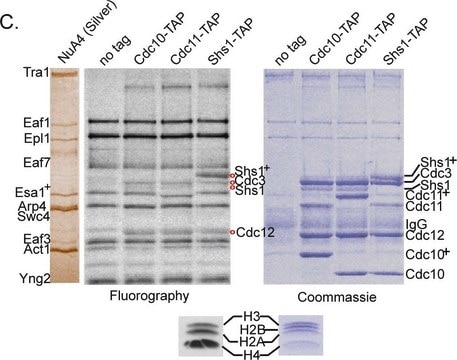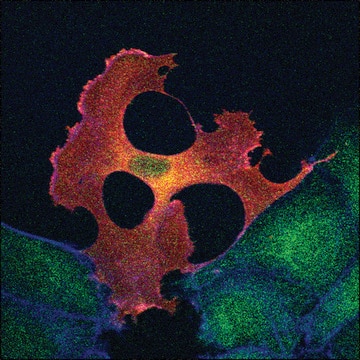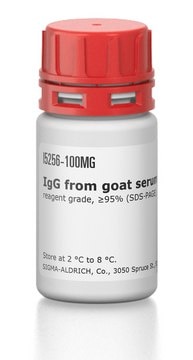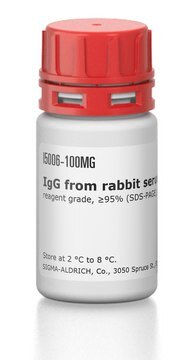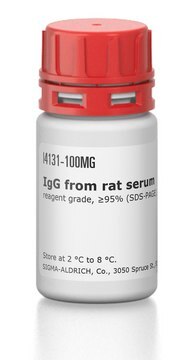NI03
Normal Mouse IgG
This Normal Mouse IgG is validated for use in ELISA, Flow Cytometry, Immunoblotting, Immunofluorescence, Immunohistochemistry, Immunoprecipitation for the detection of Mouse IgG, Non-immune.
Sign Into View Organizational & Contract Pricing
All Photos(1)
About This Item
UNSPSC Code:
12352202
Recommended Products
biological source
mouse
Quality Level
antibody form
serum
form
liquid
contains
≤0.1% sodium azide as preservative
manufacturer/tradename
Calbiochem®
storage condition
do not freeze
shipped in
wet ice
storage temp.
2-8°C
General description
Native IgG from mouse serum. IgG is a glycoprotein found in serum and tissue fluids. For use as a negative control in parallel with specific mouse IgG-type primary antibodies.
Application
ELISA (see comments)
Flow Cytometry (see comments)
Immunoblotting (see comments)
Immunofluorescence (see comments)
Immunohistochemistry (see comments)
Immunoprecipitation (see comments)
Flow Cytometry (see comments)
Immunoblotting (see comments)
Immunofluorescence (see comments)
Immunohistochemistry (see comments)
Immunoprecipitation (see comments)
Packaging
Please refer to vial label for lot-specific concentration.
Warning
Toxicity: Standard Handling (A)
Physical form
In 50 mM sodium phosphate buffer, 0.2% gelatin, pH 7.5.
Other Notes
Normal IgG are provided to be used as negative controls for purified antibodies from Calbiochem. For use as a negative control, perform experiments in parallel using primary antibody or normal serum at the same concentration. A signal obtained with the normal serum indicates a nonspecific interaction; any additional signal with the primary antibody indicates a specific antibody-antigen interaction.
Legal Information
CALBIOCHEM is a registered trademark of Merck KGaA, Darmstadt, Germany
Storage Class
11 - Combustible Solids
wgk_germany
WGK 1
flash_point_f
Not applicable
flash_point_c
Not applicable
Certificates of Analysis (COA)
Search for Certificates of Analysis (COA) by entering the products Lot/Batch Number. Lot and Batch Numbers can be found on a product’s label following the words ‘Lot’ or ‘Batch’.
Already Own This Product?
Find documentation for the products that you have recently purchased in the Document Library.
Customers Also Viewed
Shuuji Mawaribuchi et al.
Scientific reports, 9(1), 11910-11910 (2019-08-17)
The potential applications of human pluripotent stem cells, embryonic stem (ES) cells, and induced pluripotent stem (iPS) cells in cell therapy and regenerative medicine have been widely studied. The precise definition of pluripotent stem cell status during culture using biomarkers
Irina Balan et al.
Brain sciences, 8(4) (2018-04-25)
Alcoholism initiates with episodes of excessive alcohol drinking, known as binge drinking, which is one form of excessive drinking (NIAAA Newsletter, 2004) that is related to impulsivity and anxiety (Ducci et al., 2007; Edenberg et al., 2004) and is also
Sandhya Yadav et al.
BMC cancer, 19(1), 1031-1031 (2019-11-05)
The deregulated alternative splicing of key glycolytic enzyme, Pyruvate Kinase muscle isoenzyme (PKM) is implicated in metabolic adaptation of cancer cells. The splicing switch from normal PKM1 to cancer-specific PKM2 isoform allows the cancer cells to meet their energy and
Seo-Yeon Lee
Experimental and therapeutic medicine, 25(1), 30-30 (2022-12-24)
Connective tissue growth factor (CTGF) is expressed at high levels in blood vessels, where it functions as a regulator of a number of physiological processes, such as cell proliferation, angiogenesis and wound healing. In addition, CTGF has been reported to
Kamil Wartalski et al.
Histochemistry and cell biology, 156(4), 349-362 (2021-07-17)
Endothelial cells (ECs), the primary component of the vasculature, play a crucial role in neovascularization. However, the number of endogenous ECs is inadequate for both experimental purposes and clinical applications. Porcine ovarian putative stem cells (poPSCs), although not pluripotent, are
Our team of scientists has experience in all areas of research including Life Science, Material Science, Chemical Synthesis, Chromatography, Analytical and many others.
Contact Technical Service
